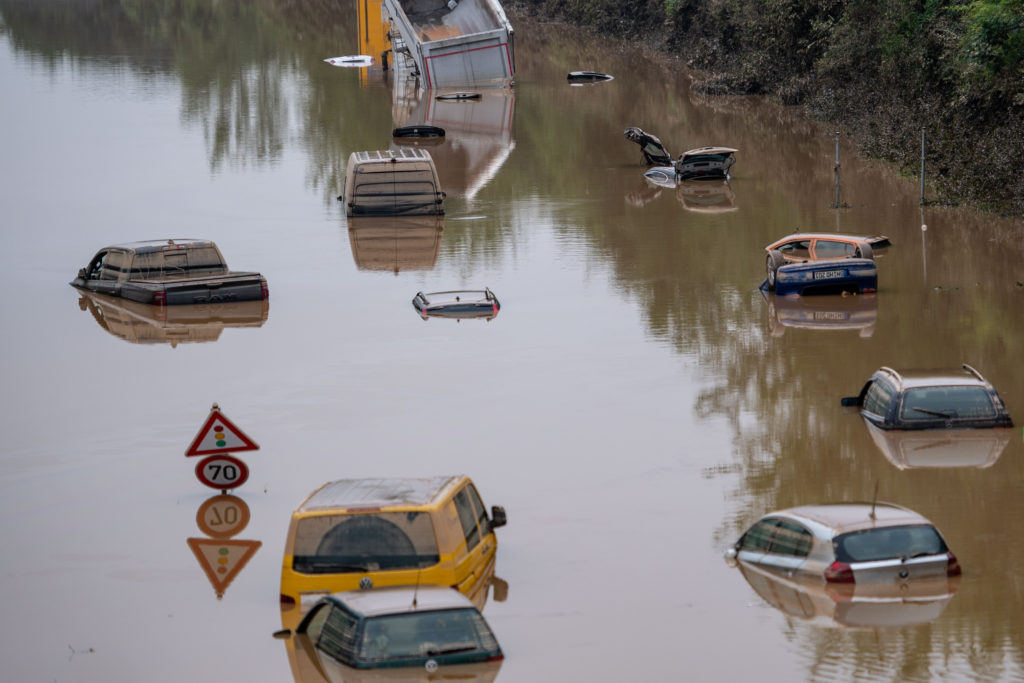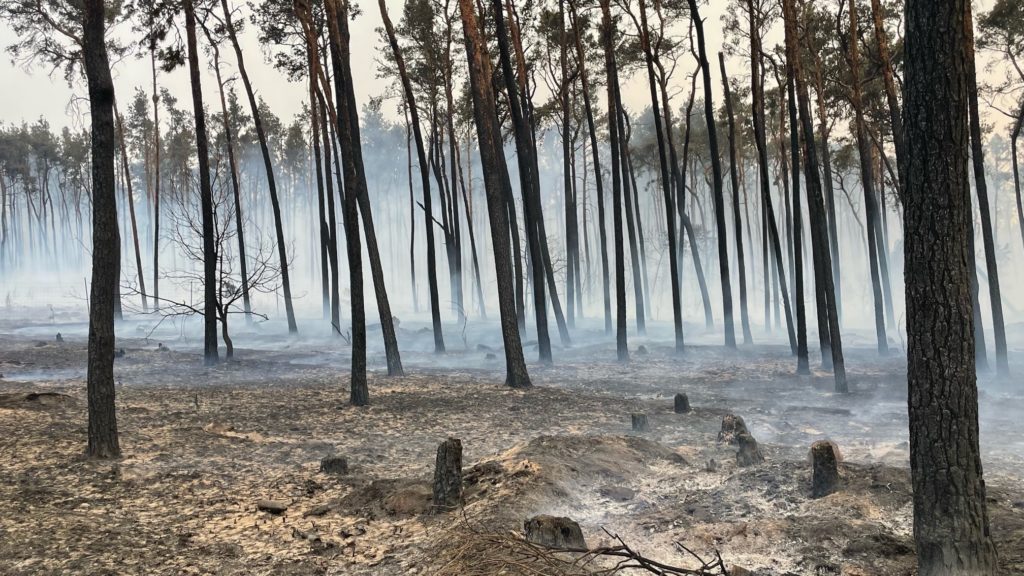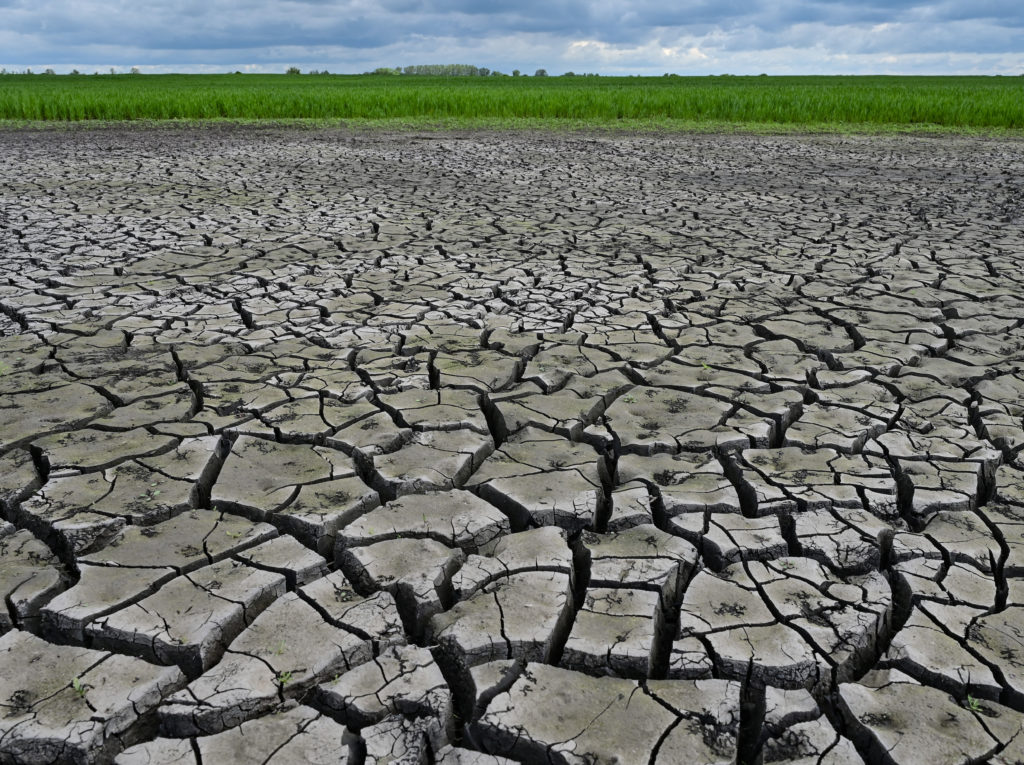More floods, droughts and heatwaves: How climate change will impact Germany

As the anniversary of the devastating floods in western Germany approaches, we spoke to a climate expert to find out how global warming is impacting the weather in Germany, and if we can expect more extreme weather events in future.
In the last few years, Germany has seen some extremely destructive weather-related incidents.
Between 2018 and 2020, almost 20,000 heat-related deaths were recorded – especially among elderly people – as the country experienced more ferocious and frequent summer heatwaves. Last July, at least 190 people died in severe floods in western Germany, with the states of Rhineland-Palatinate and North Rhine-Westphalia worst hit. Last month, two villages in Brandenburg had to be evacuated as a large forest fire raged on the border with neighbouring Saxony.
READ ALSO: One year on - How life has changed for German flood survivors
We spoke to Dr. Diane Rechid, Head of the Department of Regional and Local Climate Change at the Climate Service Center Germany and an expert on regional climate modelling, to find out if such extreme weather events are a direct result of climate change and if we can expect more of them in the future.
The Local: How has Germany’s climate changed over the last 100 years?
Dr. Rechid: One clear change that we’ve observed is an increase in temperature. Since 1880 there’s been an average global temperature increase of 1.2C, and in Germany an average temperature increase of 1.6C. The average in Germany is higher because the air temperature gets warmer over land masses than over regions by the sea.
Does that mean it’s been getting hotter every year?
No, there are fluctuations from year to year: sometimes, for example, it’s two degrees more, sometimes two degrees less. We have to look at longer periods of time to see if there is a pattern. We look at the 30-year average, so we can see that these numbers fluctuate around higher and higher 30-year average temperatures.
What kind of impact do these high temperatures have on the environment?
As well as directly affecting people’s health, high temperatures also affect vegetation. For example, many trees and plants need the cold stimulus and in warmer winters, vegetation loses its vital rest period. Also, when the ground freezes, certain soil structures form that are then important for plant life in the summer and when this doesn’t happen because of warmer temperatures, it can affect plant development.
READ ALSO: How climate change is threatening Germany’s forests
Are floods, like those of last year, also linked to climate change?
Yes, we can say that the probability of such events has increased due to climate change.
As well as increasing temperatures, the other thing that is happening is a change in precipitation. Global warming changes the water circulation in the atmosphere, and it changes how much water the atmosphere can absorb.

Cars stand in water on the flooded federal highway 265. The flood disaster in the Eifel and the Ahr valley in July 2021 was caused by days of heavy rainfall. Photo: picture alliance/dpa | Marius Becker
What I see changing in Germany is the distribution of rainfall over the year, so there are long periods of little rainfall and then individual events with particularly high rainfall. What happened last year was there was torrential rainfall concentrated in a couple of areas, and these areas were places where the water couldn’t be so easily distributed and recede, as it would be able to in flatter regions.
READ ALSO: Climate change made German floods 'more likely and more intense'
Does that mean that some regions are affected by a lack of rainfall?
Yes, as there is an imbalance in rainfall distribution, there are some regions – the east of Germany in particular – which are seeing severe droughts.
In Brandenburg, for example, there are many lakes, where the groundwater level is sinking, and some lakes are no longer there. The soil is then drier, and this leads to an increased risk of forest fires, like those we saw recently.
Do you expect more extreme weather events to continue happening?
Well, you can't say exactly what will happen, but it is very likely that these extreme weather events will continue and, with increasing warming, become more frequent and more intense.
What we are seeing now are the effects of the greenhouse gas emissions of the last decades, because it takes a while for the Earth’s systems to react to this change. So even if we stop all emissions now, the impact would still become apparent in the next decades and beyond.
That’s why it’s so critical that we drastically reduce greenhouse gas emissions and don’t let global temperatures climb any higher, as this will have devastating consequences in the next decades and beyond.
Do you feel concerned by the extreme weather events you’re seeing in Germany at the moment?
Yes, by the heavy rainfall, heat and drought.
I think many cities in Germany are not yet sufficiently prepared for the heavy rainfall periods and I think people should be made much more aware of this and take more precautions.

A burned forest between Kosilenzien and Nieska in the Elbe-Elster district in June 2022. Photo: picture alliance/dpa | Julius-Christian Schreiner
But while the flooding is well covered by the press, I also find the heat periods and droughts concerning. This is more of a slow process which is going on in the background, but with increased mortality in periods of extreme heat and increasing forest fires, these events are just as dramatic as heavy rain events and floods.
What can be done to prepare for extreme weather events?
In the case of heavy rainfall, it’s really important to take this into consideration when planning the layout of towns and cities.
Areas at risk of flooding should no longer be built on, which at the moment is still happening. If you have a plot of land and a building or infrastructure, you need to be aware of where the water would converge in the event of a flood so you can plan how to react in an emergency.
READ ALSO: How heatwaves in Germany have led to thousands of deaths
In the case of extreme heat, it’s important for cities to provide more shade and cooler places for people. It’s also important for people to adapt their behaviour in these hot periods, by drinking more, moving less, spending time in cool places in the hottest parts of the day and not driving cars with combustion engines during hot periods.
Do you think Germany is well prepared for more extreme weather events?
Though Germany has a lot of climate protection initiatives, there is still far too little being done in the area of climate adaptation.
A lot of regions are starting to hire climate adaptation managers and there is a government programme where local authorities can apply for funding for projects to create climate adaptation strategies.
But, of course, developing a strategy and then implementing it takes time. I think there is still a lot of need for action, especially in smaller municipalities which have hardly any resources and also limited personnel.

The earth in a field in the Oderbruch region is dried out and cracked open. Photo: picture alliance/dpa | Patrick Pleul
Can The Local Germany readers do anything to prevent more extreme weather events in the future?
One good thing to come out of the recent Intergovernmental Panel on Climate Change (IPCC) report, is that it made it clear that individual behaviour has an important and decisive role to play in climate protection.
Some practical things that readers can do are to save energy, switch to the use of renewable energies as much as possible, and avoid food waste, as this is a big issue in Germany. Those who own their own property can make sure it’s well insulated and switch to heating systems powered by pumps or renewable energies.
The other really important thing is, of course, to keep talking about climate change and to make sure that it stays in the foreground of the national debate, and that all our daily decisions are geared towards climate protection.
READ ALSO: Climate change - Germany says time is 'running out' to save planet
Comments (1)
See Also
In the last few years, Germany has seen some extremely destructive weather-related incidents.
Between 2018 and 2020, almost 20,000 heat-related deaths were recorded – especially among elderly people – as the country experienced more ferocious and frequent summer heatwaves. Last July, at least 190 people died in severe floods in western Germany, with the states of Rhineland-Palatinate and North Rhine-Westphalia worst hit. Last month, two villages in Brandenburg had to be evacuated as a large forest fire raged on the border with neighbouring Saxony.
READ ALSO: One year on - How life has changed for German flood survivors
We spoke to Dr. Diane Rechid, Head of the Department of Regional and Local Climate Change at the Climate Service Center Germany and an expert on regional climate modelling, to find out if such extreme weather events are a direct result of climate change and if we can expect more of them in the future.
The Local: How has Germany’s climate changed over the last 100 years?
Dr. Rechid: One clear change that we’ve observed is an increase in temperature. Since 1880 there’s been an average global temperature increase of 1.2C, and in Germany an average temperature increase of 1.6C. The average in Germany is higher because the air temperature gets warmer over land masses than over regions by the sea.
Does that mean it’s been getting hotter every year?
No, there are fluctuations from year to year: sometimes, for example, it’s two degrees more, sometimes two degrees less. We have to look at longer periods of time to see if there is a pattern. We look at the 30-year average, so we can see that these numbers fluctuate around higher and higher 30-year average temperatures.
What kind of impact do these high temperatures have on the environment?
As well as directly affecting people’s health, high temperatures also affect vegetation. For example, many trees and plants need the cold stimulus and in warmer winters, vegetation loses its vital rest period. Also, when the ground freezes, certain soil structures form that are then important for plant life in the summer and when this doesn’t happen because of warmer temperatures, it can affect plant development.
READ ALSO: How climate change is threatening Germany’s forests
Are floods, like those of last year, also linked to climate change?
Yes, we can say that the probability of such events has increased due to climate change.
As well as increasing temperatures, the other thing that is happening is a change in precipitation. Global warming changes the water circulation in the atmosphere, and it changes how much water the atmosphere can absorb.

What I see changing in Germany is the distribution of rainfall over the year, so there are long periods of little rainfall and then individual events with particularly high rainfall. What happened last year was there was torrential rainfall concentrated in a couple of areas, and these areas were places where the water couldn’t be so easily distributed and recede, as it would be able to in flatter regions.
READ ALSO: Climate change made German floods 'more likely and more intense'
Does that mean that some regions are affected by a lack of rainfall?
Yes, as there is an imbalance in rainfall distribution, there are some regions – the east of Germany in particular – which are seeing severe droughts.
In Brandenburg, for example, there are many lakes, where the groundwater level is sinking, and some lakes are no longer there. The soil is then drier, and this leads to an increased risk of forest fires, like those we saw recently.
Do you expect more extreme weather events to continue happening?
Well, you can't say exactly what will happen, but it is very likely that these extreme weather events will continue and, with increasing warming, become more frequent and more intense.
What we are seeing now are the effects of the greenhouse gas emissions of the last decades, because it takes a while for the Earth’s systems to react to this change. So even if we stop all emissions now, the impact would still become apparent in the next decades and beyond.
That’s why it’s so critical that we drastically reduce greenhouse gas emissions and don’t let global temperatures climb any higher, as this will have devastating consequences in the next decades and beyond.
Do you feel concerned by the extreme weather events you’re seeing in Germany at the moment?
Yes, by the heavy rainfall, heat and drought.
I think many cities in Germany are not yet sufficiently prepared for the heavy rainfall periods and I think people should be made much more aware of this and take more precautions.

But while the flooding is well covered by the press, I also find the heat periods and droughts concerning. This is more of a slow process which is going on in the background, but with increased mortality in periods of extreme heat and increasing forest fires, these events are just as dramatic as heavy rain events and floods.
What can be done to prepare for extreme weather events?
In the case of heavy rainfall, it’s really important to take this into consideration when planning the layout of towns and cities.
Areas at risk of flooding should no longer be built on, which at the moment is still happening. If you have a plot of land and a building or infrastructure, you need to be aware of where the water would converge in the event of a flood so you can plan how to react in an emergency.
READ ALSO: How heatwaves in Germany have led to thousands of deaths
In the case of extreme heat, it’s important for cities to provide more shade and cooler places for people. It’s also important for people to adapt their behaviour in these hot periods, by drinking more, moving less, spending time in cool places in the hottest parts of the day and not driving cars with combustion engines during hot periods.
Do you think Germany is well prepared for more extreme weather events?
Though Germany has a lot of climate protection initiatives, there is still far too little being done in the area of climate adaptation.
A lot of regions are starting to hire climate adaptation managers and there is a government programme where local authorities can apply for funding for projects to create climate adaptation strategies.
But, of course, developing a strategy and then implementing it takes time. I think there is still a lot of need for action, especially in smaller municipalities which have hardly any resources and also limited personnel.

Can The Local Germany readers do anything to prevent more extreme weather events in the future?
One good thing to come out of the recent Intergovernmental Panel on Climate Change (IPCC) report, is that it made it clear that individual behaviour has an important and decisive role to play in climate protection.
Some practical things that readers can do are to save energy, switch to the use of renewable energies as much as possible, and avoid food waste, as this is a big issue in Germany. Those who own their own property can make sure it’s well insulated and switch to heating systems powered by pumps or renewable energies.
The other really important thing is, of course, to keep talking about climate change and to make sure that it stays in the foreground of the national debate, and that all our daily decisions are geared towards climate protection.
READ ALSO: Climate change - Germany says time is 'running out' to save planet
Join the conversation in our comments section below. Share your own views and experience and if you have a question or suggestion for our journalists then email us at [email protected].
Please keep comments civil, constructive and on topic – and make sure to read our terms of use before getting involved.
Please log in here to leave a comment.